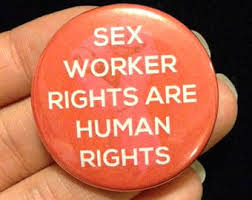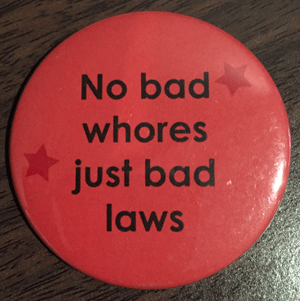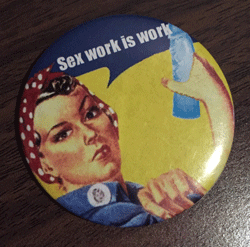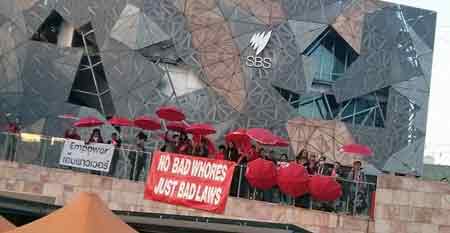
On 26th March 2015 notorious rapist and murderer Adrian Bayley was convicted of the rape of a sex worker. On Wednesday 13th July 2016 the Victorian Court of Appeal quashed Bayley’s conviction, on the basis of the identification, made by the victim after seeing Bayley’s picture on FaceBook in a post relating to Jill Meagher’s murder. Crime Victims Support Association President Noel McNamara called the decision “disgusting” and said it tells victims “they don’t get fair treatment in the courts”.
Is this really even news? Reporting rape to police, going through the court process, is deeply unpleasant. Name suppression should be automatic for survivors of rape – but it isn’t. A survivor’s sexual history shouldn’t be admissible in court – but is. Prior medical and counseling records shouldn’t be allowed as evidence – but are.
I am a current sex worker. I have been raped. I have never made a report to police. In Victoria, under the licensing system, police are the regulators of sex work. But police are not the people you reach out to for help when they regulate your work. If we are working as street based sex workers or outside the licensing system, we can be charged for this when we report crimes committed against us. Police continue to talk up the fact that they can “exercise discretion” over whether to charge sex workers in these cases. Please understand, your “discretion” does not comfort us. We need the same rights as other members of the public. In the Adrian Bayley case alone there were at least ten other sex workers who did not trust police enough to give evidence.
In court we face being questioned about our work – judged and treated unfairly – in addition to the already traumatic questioning survivors of rape face. When rape cases involving sex workers are reported in media, the focus will almost always be our occupation.
Even if there is a conviction, Victorian sentencing guidelines allow for judges to give lesser sentences to offenders that rape sex workers, as rape would not cause:
(the) “reaction of revulsion which it might cause in a chaste woman”
If it sounds like these guidelines date back to the turn of the century, it’s worth pointing out the cases the guidelines are based on are from 1981 (Harris) and 1991 (Harkopian) [1].
Vixen Collective (Victoria’s peer only sex worker organisation) has made numerous submissions to the Victorian Government asking to have these profoundly offensive sentencing guidelines overturned – the government has yet to respond to or act on these recommendations.
Each time a sex worker receives unfair treatment at the hands of police, each case where an offender walks away unpunished, every time a rapist receives a short sentence, where victims and our community are placed on trial in the media – all are another red light to sex workers telling us we cannot get justice in Victoria.
In February this year, Vixen Collective recommended that the Victorian Government decriminalise sex work – a step that would have provided better access to police and justice – but a step that was not taken. In doing so the government ignored not only Victorian sex workers, but the policy advice of every peer sex worker organisation in Australia, the United Nations[i], World Health Organisation[ii], Amnesty International[iii] and other organisations too numerous to mention[iv].
The Victorian justice system should do better for all survivors of rape and we should fight for it to be improved together. But right now sex workers are shut out from even the limited justice on offer to other survivors.
It’s time for the Victorian Government to start listening to sex workers and do something about it.
NOTE: this opinion editorial is endorsed by Vixen Collective (Victoria’s peer only sex worker organisation)

WHAT CAN YOU DO TO HELP?
Listen to sex workers. We are the experts on our lives and work.
What can you do right now?
In late 2015 the Victorian Law Reform Commission (VLRC) ran a review into ‘The Role of Victims of Crime in the Criminal Trial Process’. As part of this process Vixen Collective raised the many issues sex workers face in accessing assistance from police and accessing justice in Victoria, including Victorian sentencing guidelines permitting judges to give reduced sentences to offenders that rape sex workers – guidelines that influence attitudes towards our community in the courts even when not officially applied.
NB – The Commission will report by the 1st of September 2016.
Join us in reminding the VLRC to address justice for sex workers in Victoria by:
Contacting the VLRC on twitter at – @VicLawReform
Emailing the VLRC at –
What can you do in the future?
Sex workers peer (sex worker only) representative organisations in Australia call for the decriminalisation of sex work for sex workers health and safety, click here to see a list of peer sex worker organisations around Australia – visit their websites and follow their social media to see how to support sex workers in your local area.

REFERENCES:
[i] The United Nations Population Fund, United Nations Development Fund and UNAIDS support the decriminalisation of sex work and note that legal empowerment of sex worker communities underpins effective HIV Responses.
‘Sex Work and the Law in Asia and the Pacific’, United Nations, 2012, pg.21-31. http://www.undp.org/content/dam/undp/library/hivaids/English/HIV-2012-SexWorkAndLaw.pdf
[ii] “Countries should work toward decriminalization of sex work and elimination of the unjust application of non-criminal laws and regulations against sex workers.”, Consolidated guidelines on HIV prevention, diagnosis, treatment and care for key populations, World Health Organisation, July 2014, pg.91.
[iii] Global movement votes to adopt policy to protect human rights of sex workers, Amnesty International, 11 August 2015.
[iv] Other organisations that support the decriminalisation of sex work include (for example):
Global Network of Sex Work Projects (NSWP)
“NSWP membership comprises 237 sex worker-led organisations in 71 countries around the globe, including local organisations as well as national and regional networks. Our regional networks in the global south and global north represent many thousands of sex workers who actively oppose the criminalisation and other legal oppression of sex work.”, ‘Why decriminalise sex work’, Global Network of Sex Work Projects (NSWP), Open Democracy, 30th July 2015, https://www.opendemocracy.net/beyondslavery/global-network-of-sex-work-projects/why-decriminalise-sex-work
Australia’s National HIV Strategy
Australian Government Department of Health and Ageing, Sixth National HIV Strategy 2010-2013, Commonwealth of Australia, Canberra, 2010 at 6.4.
Global Alliance Against Traffic in Women (GAATW)
“We know from them that the decriminalisation of sex work is the only way to ensure that sex workers are able to work in safety and be protected from violence and exploitation. … Often, sex workers and their clients are best positioned to detect and report cases of human trafficking or exploitative labour situations. This can only happen in a decriminalised environment, where neither party is afraid of prosecution.”, ‘Global Alliance Against Traffic in Women – Submission to Scotland Parliament in Support of Decriminalisation of Sex Work’
Global Commission on HIV and the Law
“Decriminalization is the first step towards better working conditions…”, Global Commission on HIV and the Law – Risks, Rights and Health, Global Commission on HIV and the Law, July 2012, pg.40.
Human Rights Watch
‘Human Rights Watch World Report 2014’, Human Rights Watch, 2014, pg.47.
Multiple Medical Studies
For example:
“Decriminalise sex work. Decriminalisation can improve the risk environment.. End impunity for crimes and abuses committed against sex workers. Advance evidence-based policies and practices in partnership with SW-led organisations. End discriminatory laws, policies and practices against female, male and transgender sex workers. .. Include civil society, incl SW-led organisations, in national policy planning. Recognise sex work as work, and develop occupational health and safety standards, mechanisms to redress violence against sex workers and other violations against labour and human rights.” Panel 4: Calls for action for stakeholders in the HIV response for sex workers, An action agenda for HIV and sex workers, The Lancet, 22nd July 2014, pg.10.
C Harcourt, J O’Connor, S Egger, C Fairly, H Wand, M Chen, L Marshall, J Kaldor, B Donovan, ‘The Decriminalisation of Prostitution is Associated with Better Coverage of Health Promotion Programs for Sex Workers’, Australian and New Zealand Journal of Public Health, 2010, 34:5 pg. 482.
Open Society Foundations
‘Understanding Sex Work in an Open Society’, Open Society Foundations, October 2015.











